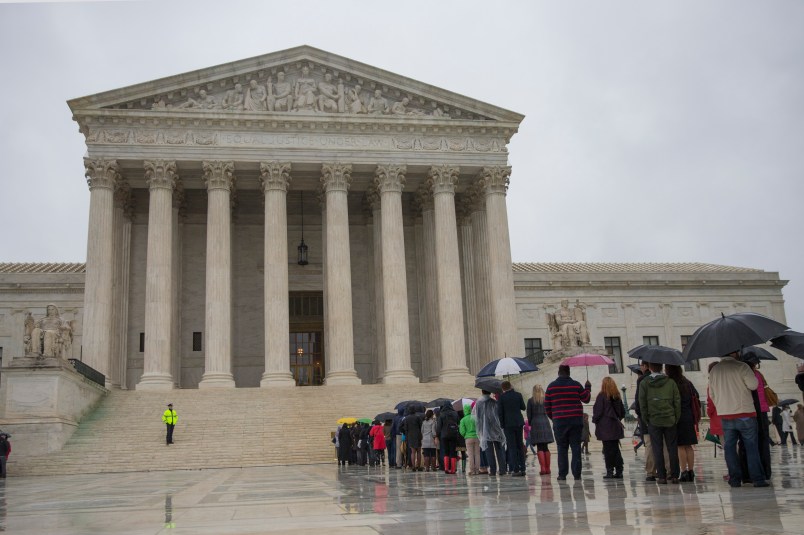A Senate committee on Thursday voted to approve an amendment to the U.S. Constitution reversing two major Supreme Court rulings and reestablishing the authority of Congress to set campaign finance limits.
The Senate Judiciary Committee passed the measure, offered by Sen. Tom Udall (D-NM) in an effort to overturn the Citizens United and McCutcheon v. FEC rulings.
The two controversial Supreme Court decisions in 2010 and 2014, respectively, wiped out limits on independent expenditures (thus giving rise to super PACs) and on the total amount a person may give to candidates and committees in an election cycle.
“Restoring the First Amendment to allow Congress and the States the authority to impose reasonable limits on campaign spending is a commonsense measure that we should all be able to support,” said Sen. Patrick Leahy (D-VT), the chairman of the committee. “All Americans should be able to participate in our democracy – not just billionaires and wealthy corporations.”
The vote was a victory for progressives, but it may be the end of the road for the proposal. The amendment passed the committee by a party-line vote of 10 to 8, winning every Democrat and none of the Republicans. The unanimous GOP opposition means it’s extremely unlikely to win the two-thirds majority needed in Congress before it can be sent to the states for ratification.
Republicans are proud of their opposition to the measure even though polls say most Americans support restoring limits on campaign finance spending.
“Washington Democrats have shown time and again how determined they are to shut down the voices of anyone who has a different point of view. Today, this determination extended to voting against the text of the First Amendment itself,” said Senate Minority Leader Mitch McConnell (R-KY), a vociferous opponent of campaign finance limits.
Democrats want to highlight that contrast in the run-up to the November elections.
The Udall amendment states that the First Amendment does not prohibit Congress or the states from setting limits on how much individuals can contribute to candidates for office, or how much can be spent by (or on behalf of) candidates. It goes out of its way to say the amendment in no way lets Congress “abridge the freedom of the press.”
Legal experts say the five Republican-appointed justices, who ruled this year that the federal government only has a legitimate interest in prohibiting direct bribery, appear ready to continue scrapping campaign finance limits if given the opportunity.







So, $$$ = Speech, and everyone is guaranteed free speech by the 1st Amendment.
In that case, I’m waiting for my check to come in the mail, because some folks have a hell of a lot more speech than me.
So he wants an amendment where congress sets the limit on contributions? By what we have seen lately, that limit will be the same as if the amendment was never brought up.
“Why yes, I think that people aught to be able to give me as much money as possible. What could go wrong?”
We need an amendment that says that corporations are not people.
How about a constitutional amendment to declare that a corporation is not a person and does not enjoy the protections and liberties provided under the Bill of Rights?
Even if that doesn’t pass, I think enough voters would see through that one. After all, Republicans love to tout Scalia’s bunk about, “if it isn’t there, you can’t say it is there.” Getting on the corporation is not a person bandwagon exposes the hypocrisy of the GOP and hits them hard on judicial philosophy.
So, indirect bribery is just fine I guess. Let’s see, if I stuff an envelope with cash and then give it to Joe over there, and then Joe gives it to his Congressperson while whispering in his ear that his friend (me) needs a tax break or a regulation gutted, then that’s not bribery, because it’s not direct? After all, Joe doesn’t need that special tax break and I never gave anything to the Congressperson, right? It’s also fine if Joe gets a little taste for being such a good friend.
If only there were, say, a national media capable of publicizing republication votes against measures like this, so that everyone would know that they’re opposed to the will of the people.